Welcome to this long blog post on Azure certifications. In this post, I will talk about everything you needed to get started/continue with your Azure journey:
This post covers the following details:
1. A lot of details of Azure certifications and the Azure certification paths to choose
2. Selecting the right Azure certifications, given that there is a host of them, which is really confusing for a newbie.
3. Some exam tips that are applicable in general for all the Azure exams.
4. A list of all Azure certifications, detailed information on each of them, exam tips, skills measured and, their weightage distribution.
But, first, let’s talk about Role-based certifications

Why Azure Certifications Are Role-based?
Earlier Microsoft Azure certifications were based on products & features. To keep pace with business requirements and to enable you to develop skills for a specific role in your organization, Microsoft has announced several Role-based certifications that replace the earlier ones.
They identified several roles for people working in the Azure platform. And the Role-based certifications, as the name indicates, are based on these roles.
Each role indicates the kinds of tasks you will do in your project. For example, an Azure Administrator will take care of the administrative side of Azure like Backup, Recovery & administering & maintaining the Azure infrastructure.
To fulfill the criteria for a role, you need to earn a related certification. For example, to demonstrate your skills for the Azure Developer role, you need to earn the Microsoft Azure Developer Associate certification.
And you earn the certification by passing relevant exams. So, here is how Roles, Certifications, and Exams are related.
| Role | Certifications | Exams to clear |
|---|---|---|
| Azure Administrator | Azure Administrator Associate | AZ-104 |
| Azure Developer | Azure Developer Associate | AZ-204 |
| Azure Solutions Architect | Azure Solutions Architect Expert | AZ-303 + AZ-304 |
| Azure DevOps Engineer | Azure DevOps Engineer Expert | AZ-400 |
| Azure Security Engineer | Azure Security Engineer Associate | AZ-500 |
| Azure AI Engineer | Azure AI Engineer Associate | AI-102 |
| Azure Data Scientist | Azure Data Scientist Associate | DP-100 |
| Azure Data Engineer | Azure Data Engineer Associate | DP-203 |
| Azure DB Administrator | Azure DB Administrator Associate | DP-300 |
Choosing the Right Azure Certification
The first step in beginning your Microsoft Azure certification journey is choosing the right certification based on your interest/skillset/role played by you in your organization.
Choosing the right certification is a multi-step decision process:
1. First, select a solution area (Refer to the image below). There are 2 solution areas within the broader set of Azure certifications.
a. Apps & Infrastructure and
b. Data & AI
2. Within each solution area, decide whether you want to do the fundamentals exam. The fundamentals exam is optional to achieve any Azure Certification, so technically you can ignore them. But, if you are new to Azure, it would make sense to do them and build a solid foundation for your upcoming Azure certifications.
3. With the decision on Fundamentals certification out of the way, you need to decide on the role to specialize in. There are several Azure roles (see in the Associate and Expert columns in the chart below), and as I said earlier, the certification exams that you take shall depend on the role you play in your organization, your skillsets, etc.,
For example, if you are a C# developer with 6 years of work experience, Azure Developer certification (AZ-204) makes sense.
Or, if you are new to the IT industry and manage your organization’s cloud infrastructure (for example, managing users in Azure AD or creating VM backups), then you are on the administration side of things in Azure, so Azure Administrator certification (AZ-104) would be more suitable.
You get the idea!
Microsoft Azure Role-based Certification Path
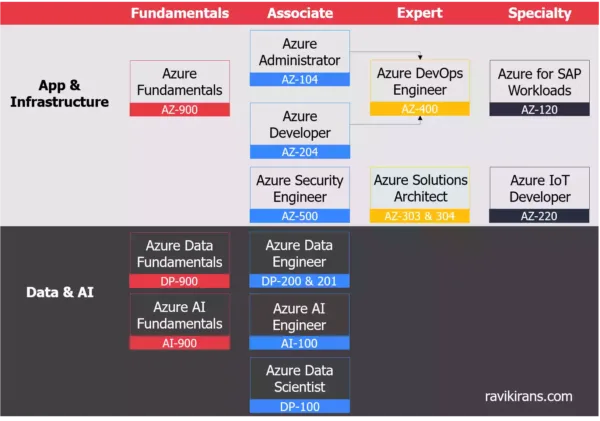
As indicated in the above chart, Microsoft Azure certifications are organized into 4 levels:
1. Fundamentals
2. Associate
3. Expert
4. Specialty
Most of the certifications require just 1 exam to clear. For example, to achieve the Azure Administrator Associate certification, you need to clear just the AZ-104 exam (unless you choose to do the optional AZ-900).
But, there are exceptions to this rule. Azure Solutions Architect Expert certification requires you to clear both AZ-303 and AZ-304 (in no apparent order). Similar is the case with Azure Data Engineer Associate certification.
And Azure DevOps Engineer Expert certification is the only one with a prerequisite that you achieve either the Azure Administrator Associate (AZ-104) or Azure Developer Associate (AZ-204) certification.
Note that the exam codes (AZ-104, DP-100) refer to the actual exam. You clear the exam (for example, DP-100) to achieve the Azure Data Scientist Certification.
Further to this, there are a few Specialty certifications (to the far right in the above image) that would be useful if you are working in a particular domain within Azure. For example SAP on Azure.
Useful Microsoft Azure Certification Tips & Information to Know
a. Azure exams are divided into sections. You can go back and update the answer but only within sections. Once you are out of a section, you cannot go back.
b. The exam format of any Azure exam is composed of the following types:
1. Case study questions: Here, you will get a set of questions concerning a specific scenario. The answer choices for each question have a long list of options than the normal ones (probably 7-8), & you need to choose 1 or more than 1 correct option. However, each question within the set will have the same set of answer choices.
2. Selecting the best answer: These types of questions may have more than 1 correct answer but there is only one best answer you need to choose. For example, both options ‘a’ and ‘b’ may be correct answers, but only one of them, for example, ‘a’ is the best answer. E.g., a solution that is the least time-consuming.
3. Multiple-choice questions: As their name indicates, these questions have around 4 options and 1 correct option to choose from.
4. Interactive questions: These questions require the user to interact with the exam designer. For example, they can be either:
Drag-and-drop: The user drags the right answer in the answer box, or order a sequence of actions to be performed, or,
Graphical multiple-choice questions (hot-answer): Here the user selects the correct graphic with the mouse click.
c. If a service or a feature is in preview, it will not be tested in the exam. So do not worry about them.

d. Don’t worry about memorizing PowerShell commands. Understand the structure of the syntax and just know your verbs and nouns. For example, any command in the Az module is in the below format:
Verb–AzNoun (where Verb describes an action like Get, Set, etc., & Noun describes a resource type).
So, in the exam, if you want to know all the commands for creating resources related to Storage Account, use the Get-Command and:
1. Specify any of the available verbs for the Verb parameter. For creating a resource, the value for the verb parameter will be ‘Get.’
2. And, concatenate the keyword Az with the resource type for the Noun parameter; in this case StorageAccount
Below is an example of how to use the Get-Command with Verb & Noun parameters
Get-Command -Verb New -Noun AzStorageAccount*
The output lists all the cmdlets that are related to creating a new Storage Account resource. Use this way to look for PowerShell commands in the exam.

e. In case you forget the syntax/structure of CLI commands, use the below command to enable the interactive mode.
az interactive
In this mode, you get more information about the CLI commands & the parameters to use. For example, once you type azure vm
1. It shows an IntelliSense of the list of commands to use, and
2. Also, a description of the command, which is ‘provisioning a VM.’
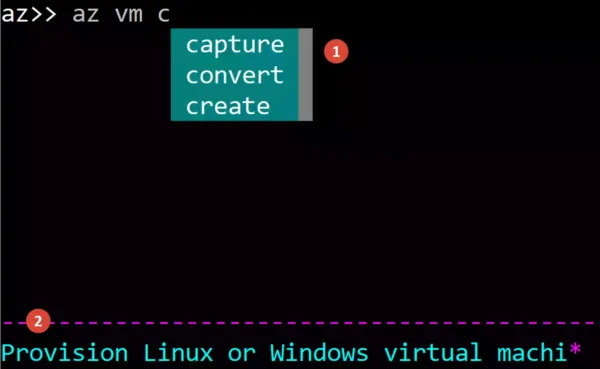
Once you select create:
1. It displays a list of all the parameters to choose, their descriptions, and,
2. Again, the description of the command at this level, which is ‘Creating an Azure Virtual Machine.’

This knowledge will come in handy during the examinations.
f. Don’t worry about memorizing trivial information like CDN features, SKU details, etc., as these can change too often and cannot be meaningfully tested.
g. Don’t skip any questions. There is no negative marking. You can even get partial marks if you correctly answer certain parts of the question.
h. Don’t use dumps to prepare. Doing so can get you barred from taking future Microsoft examinations. However, I strongly suggest you validate your understanding with practice questions.
i. Like all Microsoft certifications, the validity of Azure certifications is 2 years. The passing percentage is 70% & each question has a different weightage. So, if there are 50 questions in the exam, only 35 correct answers may not guarantee a pass.
j. Expect the labs, if they are in the exam, to be very slow. It will test your patience.
k. A good reason to take these exams now is that the labs are off. We do not know when this will be the case, but without those labs (which tend to be slow), you can expect to easily complete the exam in time.
AZ-900 Microsoft Azure Fundamentals
AZ-900 is the entry-level exam aimed at beginners entering the Azure ecosystem. It is an optional exam to achieve any Certification, so many would consider skipping the exam.
However, in my view, if you are new to Cloud/Azure, or have considerably less experience, it makes sense to attend the exam and cover your bases on the fundamentals of cloud computing. Doing so would make future Azure certifications a breeze.
If your goal is only to achieve the Certifications (Architect, Developer, etc.,), feel free to skip the exam. If you are in it for the long haul, & looking to solidify your fundamentals, do the AZ-900 and minimize your knowledge gaps.
The AZ-900 exam covers a variety of questions: Drag and drop (move responses to correct order), questions in graphical form, multiple-choice questions (sometimes 2 or more correct answers).
Azure Fundamentals Learning Path
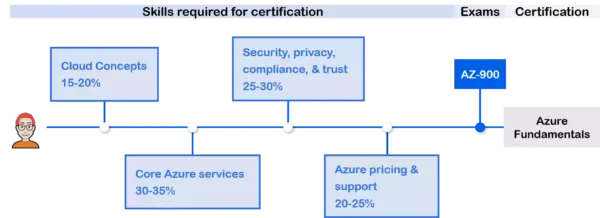
AZ-900 Azure Fundamentals Exam Details
| Exam Name | AZ-900 Microsoft Azure Fundamentals |
| Requirement for | Microsoft Certified: Azure Fundamentals |
| Cost of the Exam | $99 [USD] |
| Total No. of. Questions | 32-40 |
| Duration of the Exam | 90 Minutes |
| Passing Score | 700/1000 |
| Job Role | Developer |
AZ-900 MS Azure Fundamentals Exam Tips
a. Since this is a fundamentals exam, many take it lightly. But if you look at the exam objectives, it still covers a wide range of topics, and sufficient preparation is necessary to clear the exam.
b. You do not have to memorize anything for the exam. Just make sure what each Azure service is about and how it will be used. It is also very important to differentiate similar-looking core Azure services (NSG & Firewall, for example).
c. You don’t need an Azure subscription for AZ 900. Save those free trials for the associate/expert-level exams further down the line.
d. Many AWS professionals also take the AZ-900 exam. But they often underestimate the preparation time required. These are different cloud platforms and have different names, and equivalent services in AWS are not always available for Azure and vice-versa. Unlearn and relearn is the mantra. No matter how much cloud experience you have, give AZ-900 its due respect and start from square one.
e. This is a theoretical exam and as such, no labs are expected.
f. To sum it up, have a good understanding of the following:
1. Pricing options, Compute options,
2. IaaS, SaaS, PaaS,
3. Different types of clouds
4. Topics related to pricing & cost
5. A Broad understanding of Core Azure & Infrastructure services.
g. You can also go through the sample AZ-900 practice tests before you attempt the exam. They have in-depth explanations for each question.
AZ-900 Skills Measured and their Weightage
| Describe cloud concepts | 20-25% |
| Describe core Azure services | 15-20% |
| Describe core solutions and management tools on Azure | 10-15% |
| Describe general security and network security features | 10-15% |
| Describe identity, governance, privacy, and compliance features | 20-25% |
| Describe Azure cost management and Service Level Agreements | 10-15% |
Amazon link (affiliate)
DP-900 Microsoft Azure Data Fundamentals
DP-900, along with AI-900 and AZ-900 are fundamental level certifications in Azure.
As with AZ-900, you can skip this exam and directly take the DP-203. But this exam covers a lot of data fundamentals. As a result, it will make your life easier when you prepare for either the Data Engineer Associate or the Database Administrator Associate certifications.
The structure of this exam is simple. You will learn Azure services related to relational, non-relational & analytic workloads.
Azure Data Fundamentals Learning Path
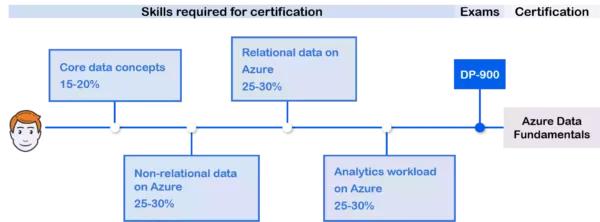
DP-900 Data Fundamentals Exam Details
| Exam Name | DP-900 Microsoft Azure Data Fundamentals |
| Requirement for | Microsoft Certified: Azure Data Fundamentals |
| Cost of the Exam | $99 [USD] |
| Total No. of. Questions | 30-40 |
| Duration of the Exam | 90 Minutes |
| Passing Score | 700/1000 |
| Job Role | Data Engineer, Database Administrator |
DP-900 Azure Data Fundamentals Exam Tips
a. DP 900 is one of the easiest Microsoft Azure exams that you can take. It’s even easier than AZ-900 where the focus was everywhere around Azure.
b. DP-900 is a very focussed exam that tests very specialized knowledge around:
1. Different types of databases,
2. How to configure them,
3. Services like Databricks, Storage accounts, Data Warehouse, Data Factory, and so on.
c. Just go through Microsoft Learn/Microsoft product documentation in detail about various data services like Azure SQL DB, Structured & Unstructured databases.
g. You can also go through the sample DP-900 practice tests before you attempt the exam. They have in-depth explanations for each question.
DP-900 Skills Measured and their Weightage
| Describe core data concepts | 15-20% |
| Describe how to work with relational data on Azure | 25-30% |
| Describe how to work with non-relational data on Azure | 25-30% |
| Describe an analytics workload on Azure | 25-30% |
AI-900 Microsoft Azure AI Fundamentals
Again, you can skip this fundamental-level certification and go directly for Azure AI Engineer Cert. But this exam is targeted at AI/ML beginners, so it builds your fundamentals. If you are new to AI/ML, give it a try.
You can use AI 900 to prepare either for Azure Data Scientist Associate (DP-100) or Azure AI Engineer Associate certification (AI-102).
The only good to have for this exam, according to Microsoft’s website, is some general programming knowledge. Data Science or AI knowledge is not required.
This exam tests an intersection of skills: Machine Learning, Artificial Intelligence, knowledge of the Azure cloud. The learning paths on Microsoft’s website will come in handy.
Azure AI Fundamentals Learning Path
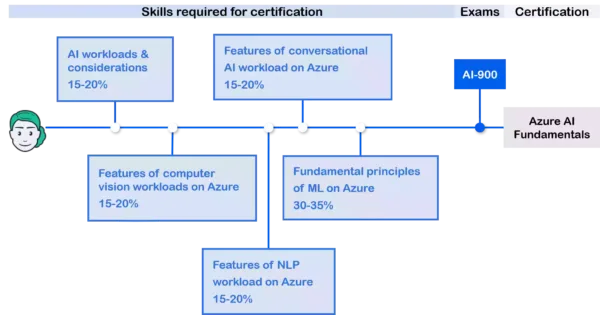
AI-900 Azure AI Fundamentals Exam Details
| Exam Name | AI-900 Microsoft Azure AI Fundamentals |
| Requirement for | Microsoft Certified: Azure AI Fundamentals |
| Cost of the Exam | $99 [USD] |
| Total No. of. Questions | 40-60 |
| Duration of the Exam | 90 Minutes |
| Passing Score | 700/1000 |
| Job Role | AI Engineer, Data Scientist, Developer |
AI-900 Azure AI Fundamentals Exam Tips
a. A great focus is on different Azure Machine Learning modules (algorithms, data preparation modules, etc.,).
b. Understand the differences between:
1. Clustering, Classification & Regression,
2. How they work,
3. What kinds of problems they can be used for,
4. Also, look into topics of custom vision/computer vision, Chatbots, Face & Speech recognition systems.
c. Know when to use each of the learning techniques. Refer to the cheat sheet to get a good idea.
d. Spend some creating models in Azure Machine Learning designer by dragging those modules and connecting them. Experiment with different parameters and see how they impact the results.
e. You can also go through the sample AI-900 practice tests before you attempt the exam. They have in-depth explanations for each question.
AI-900 Skills Measured and their Weightage
| Describe AI workloads and considerations | 15-20% |
| Describe fundamental principles of machine learning on Azure | 30-35% |
| Describe features of computer vision workloads on Azure | 15-20% |
| Describe features of NLP workloads on Azure | 15-20% |
| Describe features of conversational AI workloads on Azure | 15-20% |
AZ-104 Microsoft Azure Administrator
AZ-104 is the most popular exam in Azure, just after AZ-900. It is targeted at Administrators and it serves as a prerequisite for AZ-400 and as an unofficial prerequisite for AZ-303 and AZ-500.
As an Azure Administrator, you will implement, manage, and monitor Azure infrastructure services like Storage, Compute (VMs, Containers, AKS), Virtual Networks & Identity (Azure Active Directory).
One of the differences from the earlier AZ-103 exam is that a dedicated domain is carved out for Backup and Recovery. Also, earlier exams have just Virtual Machines in the Compute section, which is now changed to Compute that contains a host of IaaS and PaaS services like VMs, Containers, and Web Apps.
There are no prerequisites for the exam. However, doing AZ-900 sets up a great platform for AZ 104
Clearing AZ-104 perfectly sets you up for AZ-303. So, go for AZ-303 next, in case you are asking what’s next?
Azure Administrator Associate Learning Path
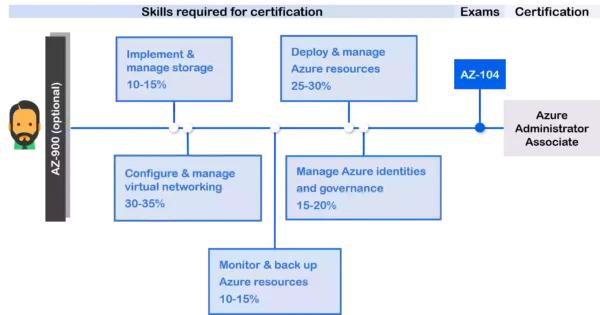
AZ-104 Azure Administrator Exam Details
| Exam Name | AZ-104 Microsoft Azure Administrator |
| Requirement for | Microsoft Certified: Azure Administrator Associate |
| Cost of the Exam | $165 [USD] |
| Total No. of. Questions | 60-65 including 1-4 case studies |
| Duration of the Exam | 180 Minutes |
| Passing Score | 700/1000 |
| Job Role | Administrator |
AZ-104 MS Azure Administrator Exam Tips
a. Don’t fret about ARM templates. You just need to understand its layout. You will not be required to create one but will be asked to pick the missing syntax.
b. Take an Azure subscription & practice the labs from Microsoft Learning
c. Labs don’t mandate the use of CLI or PowerShell; Only the end result matters
d. Focus on areas related to cost optimization/effectiveness. Also, Azure services like Storage accounts, ACI/AKS, Azure Web App, NSG rules, Azure Firewall, and Networking concepts like address spaces and Subnets.
e. You can also go through the sample AZ-104 practice tests before you attempt the exam. They have in-depth explanations for each question.
AZ-104 Skills Measured and their Weightage
| Manage Azure identities and governance | 15-20% |
| Implement and manage storage | 15-20% |
| Deploy and manage Azure compute resources | 20-25% |
| Configure and manage virtual networking | 25-30% |
| Monitor and back up Azure resources | 10-15% |
AZ-204 Developing Solutions for Microsoft Azure
The AZ 204 is a trimmed-down version of the earlier AZ-203, with more focus on objectives aimed at the developer role.
Microsoft requires that you have worked at least 1-2 years as a developer with Azure before you attempt the exam.
Understand and spend more time learning how to create and manage resources with C# SDKs and CLIs.
If you are coming from other programming backgrounds like Java, you still need to have some knowledge/understanding of C# as the code blocks were in C# (from Azure SDK and CLI).
Azure Developer Associate Learning Path
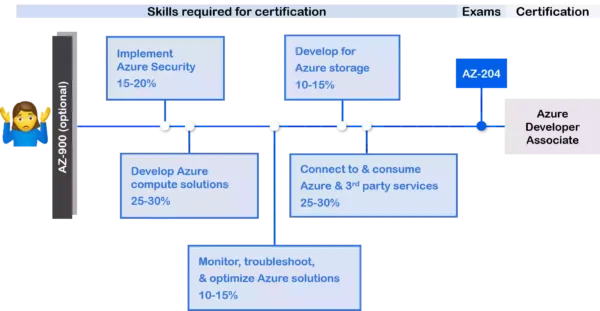
AZ-204 Azure Developer Exam Details
| Exam Name | AZ-204 Developing Solutions for Microsoft Azure |
| Requirement for | Microsoft Certified: Azure Developer Associate |
| Cost of the Exam | $165 [USD] |
| Total No. of. Questions | 45 & 2 case studies (around 15 questions) |
| Duration of the Exam | 210 Minutes |
| Passing Score | 700/1000 |
| Job Role | Developer |
AZ-204 Microsoft Azure Developer Exam Tips
a. Learn all the different ways the Azure services expose their APIs. Begin with all the ‘az’ commands. In addition to that, focus on the .NET library classes & REST API for all Azure services.
b. Although many Azure services provide similar functionality (for example, Event Grid & Event Hub), they are designed for specific use cases. Try to understand each of them, as the exam tests your judgment on the selection of services for any scenario.
c. Even though the exam tests for a developer role, you will not be asked to write any code. Probably you will need to select the right code/sequence of codes
d. There were some reports that questions from AKS were there, in spite of the fact that it was absent from the exam objectives. Microsoft later replaced AKS with Docker, so I think you needn’t fret on AKS anymore.
e. You can also go through the sample AZ-204 practice tests before you attempt the exam. They have in-depth explanations for each question.
AZ-204 Skills Measured and their Weightage
| Develop Azure compute solutions | 25-30% |
| Develop for Azure storage | 15-20% |
| Implement Azure security | 20-25% |
| Monitor, troubleshoot, and optimize Azure solutions | 15-20% |
| Connect to & consume Azure services & third-party services | 15-20% |
AZ-303 Microsoft Azure Architect Technologies
Similar to other new Azure exams like AZ-204, AZ-303 has a narrower focus on the exam objectives compared to AZ-300, targeting the Solution Architects.
You need to clear both AZ-303 and AZ-304 to get the Microsoft Certified: Solution Architect Expert certification, however in any order. These exams do not have any prerequisites.
You are required to demonstrate expertise in designing & implementing solutions on Azure that use services like Storage account, VNets, & Azure Compute.
AZ 303 is going to be difficult. It is an expert-level certification as there is a great deal of implied knowledge you need, which typically you accumulate over years of work in Azure, to clear the exam.
The above point is not meant to discourage you. You can still come in new, put in weeks of hard work, and luckily, even clear the exam, but I feel, you may not be able to do justice to the role of Solutions architect in your organization.
Microsoft Azure Solutions Architect Learning Path
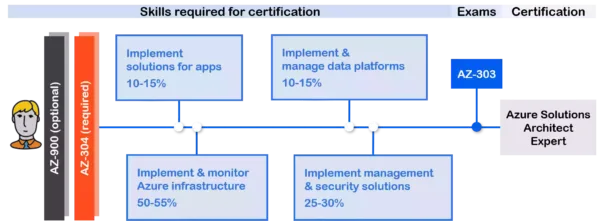
AZ-303 Microsoft Azure Architect Exam Details
| Exam Name | AZ-303 Microsoft Azure Architect Technologies |
| Requirement for | Microsoft Certified: Azure Solutions Architect Expert |
| Cost of the Exam | $165 [USD] |
| Total No. of. Questions | 40-60 |
| Duration of the Exam | 180 Minutes |
| Passing Score | 700/1000 |
| Job Role | Solutions Architect |
AZ-303 Azure Architect Technologies Exam Tips
a. Some reported not having any questions related to CLI/PowerShell. But Microsoft exams can definitely surprise you. Be prepared anyway.
b. AZ-303 (just like AZ-900, but more advanced) is at the intersection of all 3 aspects of building solutions in Azure:
1. Hybrid cloud infrastructure
2. Data analytics
3. Best-in-class applications
c. You can also go through the sample AZ-303 practice tests before you attempt the exam. They have in-depth explanations for each question.
AZ-303 Skills Measured and their Weightage
| Implement and monitor an Azure Infrastructure | 50-55% |
| Implement Management and Security Solutions | 25-30% |
| Implement Solutions for Apps | 10-15% |
| Implement and Manage Data Platforms | 10-15% |
AZ-304 Microsoft Azure Architect Design
The difference between AZ-304 and AZ-303 is this: AZ-303 is more implementation-focused. AZ-304 is design-focused.
One more difference between AZ-303 and AZ-304 is that AZ-303 is skewed towards the administration side of things; that’s why it is a good idea to hop onto AZ-303 after AZ-104. Whereas AZ-304 is more oriented towards a developer (AZ-204). So, depending on which one you did earlier (AZ-104 or AZ-204), choose AZ-303 or AZ-304 to go next.
Preparing for AZ-303 will prepare you for AZ-304 too. AZ-304 is all about the same set of services as AZ-303. But just design.
In fact, a more efficient approach would be to study for both the tests together & take the exams in a week’s time while your memory is still fresh.
There is a reason that the design exam comes behind the implementation exam (order of exam code). Going through the actual implementation (AZ-303) will help tons in thinking about the design and architecture (AZ-304) of the solution.
Azure Solutions Architect Design Learning Path
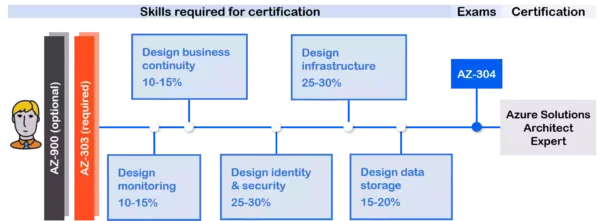
AZ-304 Azure Architect Design Exam Details
| Exam Name | AZ-304 Microsoft Azure Architect Design |
| Requirement for | Microsoft Certified: Azure Solutions Architect Expert |
| Cost of the Exam | $165 [USD] |
| Total No. of. Questions | 40-60 |
| Duration of the Exam | 90 Minutes |
| Passing Score | 700/1000 |
| Job Role | Solutions Architect |
AZ-304 Azure Architect Design Exam Tips
a. AZ-304 tests about how do you take your existing knowledge of implementing Azure solutions (Read: AZ-303) and design the right solution as per the business requirements. So AZ 304 is one level up.
b. You should be able to analyze a set of requirements/project constraints and examine why a specific solution is the best.
C. ‘Best’ can mean different things in different scenarios. For example, the most cost-effective, least time-consuming, etc.,
d. In a nutshell, if you have to consider yourself well-prepared for the exam, you should be able to demonstrate the understanding of the entire suite of Azure services, so you can recommend one architecture over another, which is obviously more efficient, according to business requirements.
AZ-304 Skills Measured and their Weightage
| Design Monitoring | 10-15% |
| Design Identity and Security | 25-30% |
| Design Data Storage | 15-20% |
| Design Business Continuity | 10-15% |
| Design Infrastructure | 25-30% |
AZ-400 Designing and Implementing Microsoft DevOps Solutions
Microsoft Azure DevOps Engineer is an expert-level certification. So, in addition to clearing AZ-400, you also need to clear an Associate level certification, either Developer Associate (AZ-204) or Administrator Associate (AZ-104)
As I said earlier, most of these Azure certifications are inter-related, so it is best to take the DevOps exam while the memory of AZ-104 is still fresh.
There has been a lot of changes since June 2020. Earlier the certification was Azure Certified DevOps Engineer. Now, it is called Microsoft Certified DevOps Engineer.
So, as the name indicates, this certification is slightly less about Azure, compared to other Azure certifications, and more about Microsoft DevOps & GitHub.
Azure DevOps Engineer Expert Learning Path
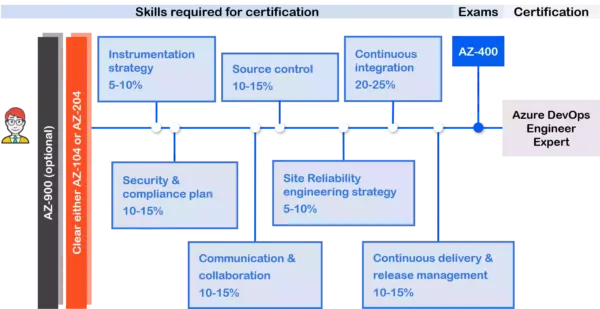
AZ-400 Azure DevOps Solutions Exam Details
| Exam Name | AZ-400 Design & Implement MS DevOps Solutions |
| Requirement for | Microsoft Certified: DevOps Engineer Expert |
| Cost of the Exam | $165 [USD] |
| Total No. of. Questions | 40 questions & 10 lab tasks |
| Duration of the Exam | 180 Minutes |
| Passing Score | 700/1000 |
| Job Role | DevOps Engineer |
AZ-400 Azure DevOps Solutions Exam Tips
a. There seems like a lot of content to go through. But the meat of it is centered around Azure DevOps Pipelines & Artifacts, Azure Repos, Test plans, GitHub actions, Migrating from Azure Pipelines to GitHub Actions, SRE, etc.,
b. There are a ton of third-party monitoring platforms like Dynatrace, Zabbix & Nagios included in the exam objectives, in addition to Azure Monitor and Application Insights. Don’t be overwhelmed. Just know how to integrate these tools into the Azure platform. Check my study guide. I pointed out links to all of them in Microsoft documentation.
c. Again as I said, unlike the other Azure exams, AZ 400 is not completely Azure or even Microsoft-related. There are a ton of third-party tools the exam objectives point to.
AZ-400 Skills Measured and their Weightage
| Develop an Instrumentation Strategy | 5-10% |
| Develop a Site Reliability Engineering (SRE) strategy | 5-10% |
| Develop a security and compliance plan | 10-15% |
| Manage source control | 10-15% |
| Facilitate communication and collaboration | 10-15% |
| Define and implement continuous integration | 20-25% |
| Implement a continuous delivery & release management strategy | 10-15% |
AZ-500 Microsoft Azure Security Technologies
For this exam, you should have decent skills in automation & scripting. Also a good understanding of different Azure services, virtualization & networking.
You only need to clear AZ-500 to attain the badge Azure Security Associate certification. There are no other exam prerequisites.
As the name indicates, if you are working in the security domain or if you are the security guy, you would love this exam.
Most of the exam focus is around:
1. Managing identities in Azure AD,
2. Protecting your solution with different Azure services,
3. Securing compute solutions & databases, &,
4. Managing security operations with Security Center & Policies.
Microsoft Azure Security Engineer Learning Path
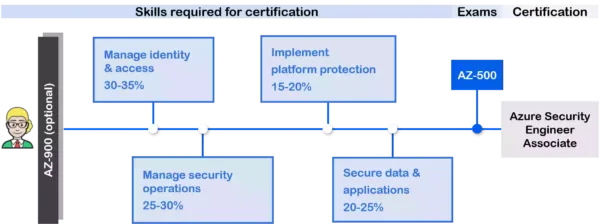
AZ-500 Azure Security Technologies Exam Details
| Exam Name | AZ-500 Microsoft Azure Security Technologies |
| Requirement for | Azure Security Engineer Associate Certification |
| Cost of the Exam | $165 [USD] |
| Total No. of. Questions | 33-41 MCQs, and Case Study |
| Duration of the Exam | 180 Minutes |
| Passing Score | 700/1000 |
| Job Role | Security Engineer |
AZ-500 Security Technologies Exam Tips
a. If you have already done AZ-104 or worked with a lot of things on Networking/network security, you should be comfortable in clearing AZ 500.
b. Know the differences in data & management planes in Key Vault, Azure VNets, Firewall, and how they work in the cloud & hybrid configurations, Azure Policy & its structure. And finally, for a security exam, it’s good to be really well prepared with Key Vault and its details.
C. Also, focus your preparation on the NSGs, ASGs & rules in NICs. Know how the VM connectivity works by placing them in different Subnets in VNets.
AZ-500 Skills Measured and their Weightage
| Manage identity and access | 30-35% |
| Implement platform protection | 15-20% |
| Manage security operations | 25-30% |
| Secure data and applications | 20-25% |
AI-102 Designing and Implementing an Azure AI Solution
This exam has no prerequisites. However, doing AI-900 will strengthen the concepts around the Azure AI platform.
AI Engineers analyze the requirements, recommend tools, design & implement AI solutions. They work with Solutions Architect, Data Scientists & Engineers to build AI solutions.
I would strongly recommend signing up for a free Azure subscription and try out labs from Microsoft documentation.
In addition to using out-of-the-box APIs (like Vision, Text, etc.,), you should also analyze requirements and decide when a custom API is required.
Azure AI Engineer Associate Learning Path

AI-102 Designing Azure AI Solution Exam Details
| Exam Name | AI-102 Design and Implement an Azure AI Solution |
| Requirement for | Microsoft Certified: Azure AI Engineer Associate |
| Cost of the Exam | $165 [USD] |
| Total No. of. Questions | 30-35 (including case study questions) |
| Duration of the Exam | 180 Minutes |
| Passing Score | 700/1000 |
| Job Role | AI Engineer |
AI-102 Design Azure AI Solution Exam Tips
a. Some of the important topics include Cognitive Services, Docker, QnA Maker, & Azure Bot Service, Text analytics API, LUIS, understanding different Compute engines & monitoring AI solutions.
b. The exam is focused on Design and scenario-based questions. Requires a lot of thinking & not a very easy exam to clear. Probably doing AI-900 should cover all the fundamentals.
c. Review this page & study different architectures & data components related to AI & Machine Learning solutions.
d. You can also go through the sample AI-102 practice tests before you attempt the exam. They have in-depth explanations for each question.
AI-102 Skills Measured and their Weightage
| Plan and manage an Azure Cognitive Services solution | 15-20% |
| Implement Computer Vision solutions | 20-25% |
| Implement natural language processing solutions | 20-25% |
| Implement knowledge mining solutions | 15-20% |
| Implement conversational AI solutions | 15-20% |
DP-100 Designing and Implementing a Data Science Solution on Azure
The difference between DP-100 and AI-102 is:
1. DP 100 is targeted at Data Scientists; AI 100 is targeted at AI Engineers.
2. DP-100 focuses on topics related to Azure Machine Learning to build custom AI. In AI-102, the exam objectives are about using pre-built AI to integrate into your applications. More details on the differences between DP-100 & AI-102
There are no prerequisites for the exam. However, AI-900 covers some fundamentals of Machine Learning on Azure.
You should have a fundamental knowledge of Azure concepts related to Artificial Intelligence and Machine Learning.
There has been a considerable focus on Python in this exam. So grab some experience in using Python to execute tasks in Azure Machine Learning.
Microsoft Azure Data Scientist Learning Path
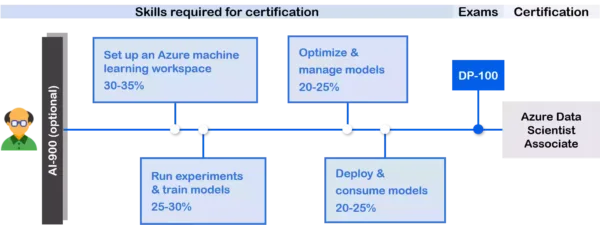
DP-100 Azure Data Scientist Exam Details
| Exam Name | DP-100 Design & Implement Data Science Solution |
| Requirement for | Microsoft Certified: Azure Data Scientist Associate |
| Cost of the Exam | $165 [USD] |
| Total No. of. Questions | 40-60 |
| Duration of the Exam | 180 Minutes |
| Passing Score | 700/1000 |
| Job Role | Data Scientist |
DP-100 Azure Data Science Solution Exam Tips
a. Practice working with the Azure Machine Learning Designer & the Python SDK. Spend a good amount of time doing labs. And brush up on your Python Data Science skills.
b. By looking at exam objectives, the focus seems to be less on theory, and more on code aspects. But don’t worry, Microsoft never asks you to write code. They are more like drag-and-drop missing code snippets types. Probably the best way you can prepare for this exam is by doing.
c. Understand which compute instances to select in specific scenarios; Which data stores to use; & AutoML.
d. Do the following tasks:
1. Create a workspace
2. Train, Deploy, Register models
3. Monitor data from ML Service
e. You can also go through the sample DP-100 practice tests before you attempt the exam. They have in-depth explanations for each question.
DP-100 Skills Measured and their Weightage
| Manage Azure resources for machine learning | 25–30% |
| Run experiments and train models | 20–25% |
| Deploy and operationalize machine learning solutions | 35–40% |
| Implement responsible machine learning | 5–10% |
DP-203 Implementing an Azure Data Solution
This exam has no prerequisites. However, doing DP-900 will strengthen the concepts around the Azure data platform.
You should be able to implement Azure data solutions that use either/combination of SQL DB, Databricks, Data Factory, Blob Storage, Synapse Analytics & Cosmos DB.
Using the above services you should be able to implement the following tasks:
1. Ingest batch & streaming data,
2. Implement a data retention policy,
3. Connecting to external data sources, and,
4. Identify & troubleshoot performance bottlenecks,
Azure Data Engineer Associate Learning Path
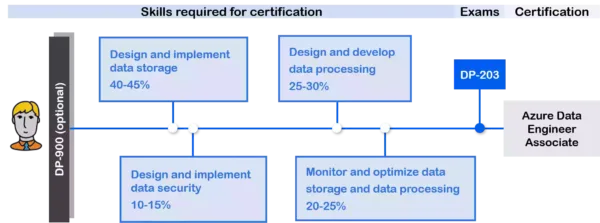
DP-203 Azure Data Solution Exam Details
| Exam Name | DP-203 Data Engineering on Microsoft Azure |
| Requirement for | Microsoft Certified: Azure Data Engineer Associate |
| Cost of the Exam | $165 [USD] |
| Total No. of. Questions | 40-60 & Case studies |
| Duration of the Exam | 180 Minutes |
| Passing Score | 700/1000 |
| Job Role | Data Engineer |
DP-203 Azure Data Solution Exam Tips
a. Some topic areas to focus on to be considered well-prepared for the DP 203 exam are (not exclusive):
1. Azure Synapse Analytics distribution
2. Cosmos DB APIs, Consistency Levels
3. Provisioning geo-replicated databases, Setting up Alerts, Altering SWU limits
4. Windowing functions in Azure Stream Analytics
b. You can also go through the sample DP-203 practice tests before you attempt the exam. They have in-depth explanations for each question.
DP-203 Skills Measured and their Weightage
| Design and implement data storage | 40-45% |
| Design and develop data processing | 25-30% |
| Design and implement data security | 10-15% |
| Monitor and optimize data storage and data processing | 10-15% |
DP-300 Administering Relational Databases on Microsoft Azure
The DP-300 exam has portions of SQL Server material sliced out of the MCSA exam 70-432 and merged with the contents of Azure Database Services.
This exam is targeted at DBAs. So, if you are a SQL Server DBA, or if you possess the MCSA Certification (MCSAs are going to be retired in early 2021), this exam will be a perfect fit.
This is a great certification to prove that your DBA skills are transferable from on-premises to the Azure cloud.
If you spend your day managing the availability & security of databases, optimizing database performance, monitoring DBs, this certification is right for you.
Azure Database Administrator Learning Path
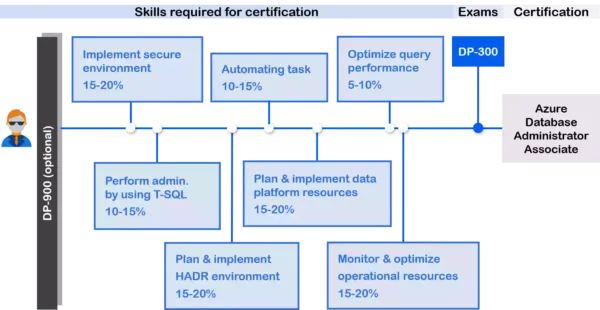
DP-300 Administer Azure DBs Exam Details
| Exam Name | DP-300 Administering Relational Databases on Azure |
| Requirement for | Azure Database Administrator Associate Certification |
| Cost of the Exam | $165 [USD] |
| Total No. of. Questions | 60-64 |
| Duration of the Exam | 180 Minutes |
| Passing Score | 700/1000 |
| Job Role | Database Administrator |
DP-300 Relational Databases Exam Tips
a. Brush your understanding of important SQL features like Backups, SQL failover, Security, Query Store, and other on-premises-related database features.
b. The exam is divided into different sections. You may have:
1. Yes/No questions
2. Hotspot questions/Drag-and-drop types
3. Multiple-choice questions and,
4. Scenario-based questions
c. Not much content is available for preparation, other than this practice test.
DP-300 Skills Measured and their Weightage
| Plan and implement data platform resources | 15-20% |
| Implement a secure environment | 15-20% |
| Monitor and optimize operational resources | 15-20% |
| Optimize query performance | 5-10% |
| Perform automation of tasks | 10-15% |
| Plan and implement a HADR environment | 15-20% |
| Perform administration by using T-SQL | 10-15% |
AZ-120 Planning and Administering Microsoft Azure for SAP Workloads
AZ-120 is one of the few exams that will help achieve the Specialty certification (Azure for SAP Workloads Specialty)
Microsoft recommends that you already have an Azure Administrator Associate or Azure Solutions Architect Expert certification before attempting this Specialty certification.
In addition to that, SAP HANA and Linux certifications are also helpful.
This exam is geared towards Azure IaaS. Knowledge of SAP migration & SAP Basis is helpful. So the certification will be more useful for Administration folks than developers (SAP ABAP, SAP BODS).
SAP Workloads Specialty Learning Path
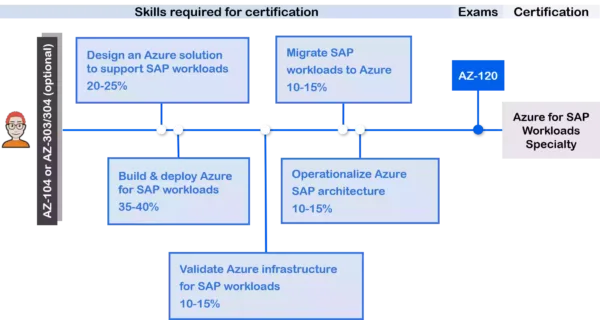
AZ-120 Azure for SAP Workloads Exam Details
| Exam Name | AZ-120 Plan & Administer Azure for SAP Workloads |
| Requirement for | Azure for SAP Workloads Specialty Certification |
| Cost of the Exam | $165 [USD] |
| Total No. of. Questions | 50+ |
| Duration of the Exam | 90 Minutes |
| Passing Score | 700/1000 |
| Job Role | Solutions Architect, Administrator |
AZ-120 Azure for SAP Workloads Exam Tips
a. To clear this Specialty level exam, you need to have good knowledge & understand the technical terms of both Azure & SAP.
b. If you are from an SAP background & are new to Azure, probably doing AZ-303 will prime you up for the AZ 120 exam. Then, the exam becomes easy to manage. However, even without AZ-303, you should be able to clear with some Azure knowledge.
c. Good to have knowledge of the compatibility of different SAP component versions in HANA, migrating systems with classical DB to HANA using Database Migration Option (DMO), and so on.
d. There are only a few online materials available for preparation, in addition to Microsoft Learn
AZ-120 Skills Measured and their Weightage
| Migrate SAP Workloads to Azure | 25–30% |
| Design & Implement an Infrastructure to Support SAP Workloads | 25–30% |
| Design & Implement High Availability and Disaster Recovery | 20–25% |
| Maintain SAP Workloads on Azure | 15–20% |
AZ-220 Microsoft Azure IoT Developer
The exam AZ-220 is most suited if you code/maintain cloud/edge parts of IoT solutions or configure IoT devices using cloud services.
Although this is a Specialty certification (the highest of the 4 levels of Azure certifications), there are no prerequisites for the exam.
The Specialty certifications are not for candidates new to the Specialty area. They are targeted at people who already have enough work experience in those roles. For example, SAP or IoT
However, even if you are new, you can still consider this certification as a gateway into IoT, as organizations are rapidly increasing their IoT adoption.
If you do not have any cloud knowledge, doing AZ-204/AZ-900 will help.
Azure IoT Developer Specialty Learning Path
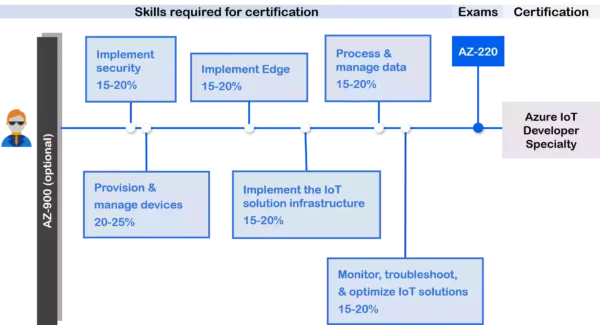
AZ-220 Azure IoT Developer Exam Details
| Exam Name | AZ-220 Microsoft Azure IoT Developer |
| Requirement for | Microsoft Certified: Azure IoT Developer Specialty |
| Cost of the Exam | $165 [USD] |
| Total No. of. Questions | 40-60 |
| Duration of the Exam | 90 Minutes |
| Passing Score | 700/1000 |
| Job Role | Developer |
AZ-220 Azure IoT Developer Exam Tips
a. Connect a Raspberry Pi online simulator to Azure IoT Hub. Generate the data and send the simulated sensor data to the IoT hub. Go through this entire workflow. If you are the curious type, you can get started with a Raspberry Pi (Amazon link) physical device.
b. Microsoft has a collaboration with Adafruit to make Microsoft IoT Pack for Raspberry Pi. You can check them out too.
AZ-220 Skills Measured and their Weightage
| Set up the IoT solution infrastructure | 10-15% |
| Provision and manage devices | 15-20% |
| Implement IoT Edge | 15-20% |
| Implement business integration | 5-10% |
| Process and manage data | 15-20% |
| Monitor, troubleshoot, and optimize IoT solutions | 15-20% |
| Implement security | 10-15% |
Follow Me to Receive Updates on Azure
Want to be notified as soon as I post? Subscribe to the RSS feed / leave your email address in the subscribe section. Share the article to your social networks with the below links so it can benefit others.



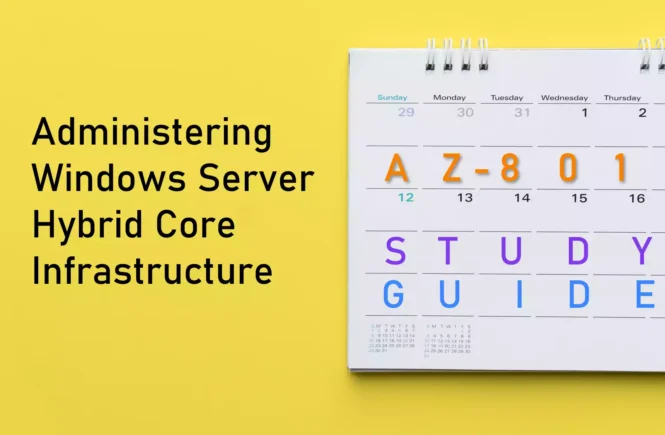
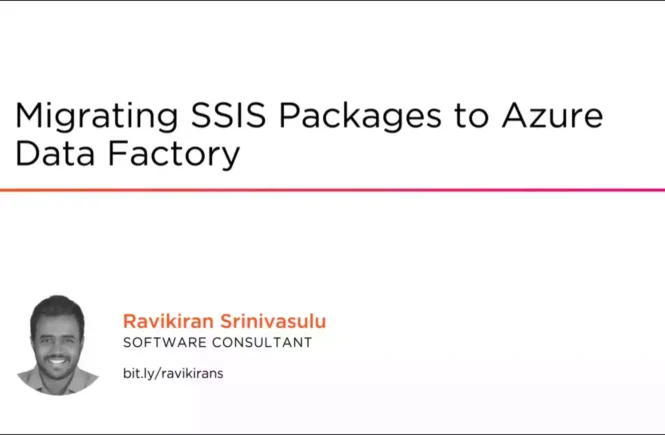
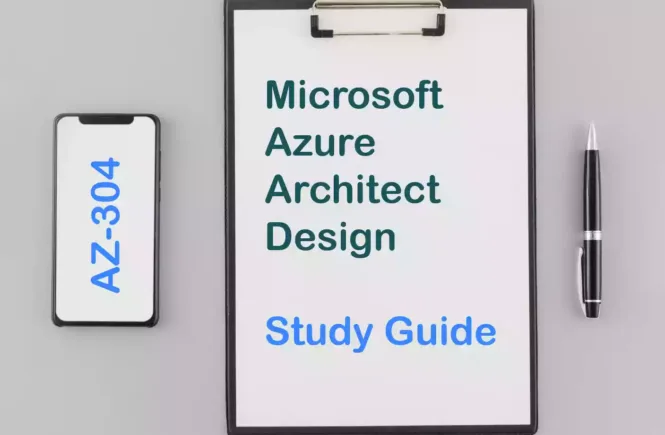
1 Comment
Hello Ravi,
Thanks for providing such a valuable information about azure certification.
Just wondering if you provide Azure training.